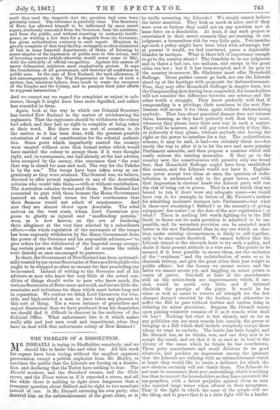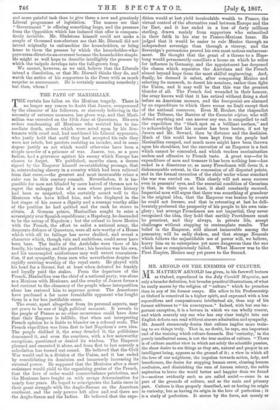THE THREATS OF A DISSOLUTION.
MR. DISRAELI is trying to Sheffieldize somebody, and we should like to know who and what for. All this week his organs have been trying, without the smallest apparent provocation, except a pettish explosion from Mr. Henley, to convince the public that the Liberals are forcing on a dissolu- tion, and declaring that the Tories have nothing to fear. The Herald mutters, and the Standard swears, and the Globe crows, and the Times writes as if it expected a storm, and all the while there is nothing in sight more dangerous than a trumpery question about Salford and its right to two members instead of one. Is Mr. Disraeli rattening his own party, who deserted him on the enfranchisement of the great cities, or is he really menacing the Liberals ? We simply cannot believe the latter assertion. They look as meek as mice, and if they were ever so furious they could not on any question now at issue force on a dissolution. At least, if any such project is entertained in their secret counsels they are running, in our judgment, a tremendous risk for very little gain. Two months ago such a policy might have been tried with advantage, but at present it would, we feel convinced, prove a deplorable blunder in tactique. What is there left of importance enough to go to the country about The franchise is, in our judgment and in theirs a bad one, too uniform, and except in the great cities too low ; but if it has been accepted, and if he goes to the country to-morrow, Mr. Gladstone must offer Household Suffrage. Great parties cannot go back, nor can the Liberals stand up at the hustings with proposals for disfranchisement. True, they may offer Household Suffrage in simpler form, but the Compounding Acts having been suspended, the householders will not consider the difference between one scheme and the other worth a struggle. They know perfectly well that if compounding is a privilege, their nominees in the next Par- liament will secure it for them again without disfranchising anybody. That fuss about parochial finance does not interest them, knowing, as they know perfectly well, that they must, whenever they please, have their own way in such a matter. They will be masters, and will pay rates directly if they like, or indirectly if they please, without anybody else having the right or the power to interfere for a day. The redistribution scheme, it may be said, is bad—we certainly think so—but surely the way to alter it is to let the new and more popular Parliament assemble, and then propose a measure which will. really redress the existing anomalies. If they go to the country now, the constituencies will perceive only one broad fact, that Household Suffrage might have been established this session, and the Liberals would not have it. English- men never accept two ideas at once, the question of redis- tribution is understood only in the great towns, and with that impression in electors' heads the Liberal party will run the risk of being cut to pieces. That is a risk which they are bound to run if there were any adequate cause—we would have run it, for example, in favour of Mr. Fawcett's motion for admitting moderate incomes into Parliament—but what is there now remaining Salford V or the necessity of giving ratepayers' due notice ? or the date of the new registration V or what ? There is nothing left worth fighting for in the Bill itself, to throw out its main provision is admitted to be im- possible, and its secondary provision can be amended much better in the new Parliament than in any one which an elec- tion, under existing circumstances, is likely to call together, only to be once more dissolved. We cannot believe that the Liberals intend at the eleventh hour to try such a policy, and doubt if their present attitude is a wise one. The points to be secured, if it were possible to secure them, are the exclusion of the " residuum " and the redistribution of seats so as to diminish bribery, and give the great cities their just weight in public affairs ; but the former we cannot secure, and the latter we cannot secure yet, and haggling on minor points is waste of power. One-half at least of the amendments still on the notice-book are improvements which, if car- ried, would be worth very little, and if defeated diminish the prestige of the party. It would be far wiser as well as easier to reserve all strength for the few changes deemed essential by the leaders, and otherwise to• suffer the Bill to pass without further and useless delay in debating its minor provisions. Suppose Mr. Disraeli insists upon passing whatever remains of it as it stands, what shall we lose ? Nothing but what is lost already, and so far as any politician can see must remain lost, namely, the power of bringing in a Bill which shall include everybody except those whom we want to exclude. The battle has been fought, and Mr. Disraeli has, as he thinks, won, and our duty now is to accept the result, and see that it is so used as to lead to the victory of the cause which he thinks he has overthrown. These petty amendments and small divisions do no good whatever, and produce an impression among the ignorant that the Liberals are dallying with an enfranchisement which at heart they would like to resist, a dalliance for which the new electors certainly will not thank them. The Liberals do not want to commence their new undertaking, which is nothing less than to convert the householders as they have converted the ten-pounders, with a latent prejudice against them as men who rejected large terms when offered to their acceptance. That is the light in which the mass of the people will see the thing, and to prove that it is a false light will be a harder
and more painful task than to give them a new and genuinely Liberal programme of legislation. The masses see that " Government is offering something large, and the pressure from the Opposition which has induced that offer is compara- tively invisible. Mr. Gladstone himself could not make a couple of thousand non-electors see that Mr. Disraeli did not intend originally to enfranchise the householders, or bring home to them the process by which the householder-who- pays-rates-direct-to-an-overseer became the householder simple. He might as well hope to describe intelligibly the process by which the tadpole develops into the full-grown frog. We cannot, however, as we said, believe that the Liberals intend a dissolution, or that Mr. Disraeli thinks they do, and watch the antics of his supporters in the Press with as much surprise as amusement. He is certainly menacing somebody ; but then, whom































 Previous page
Previous page